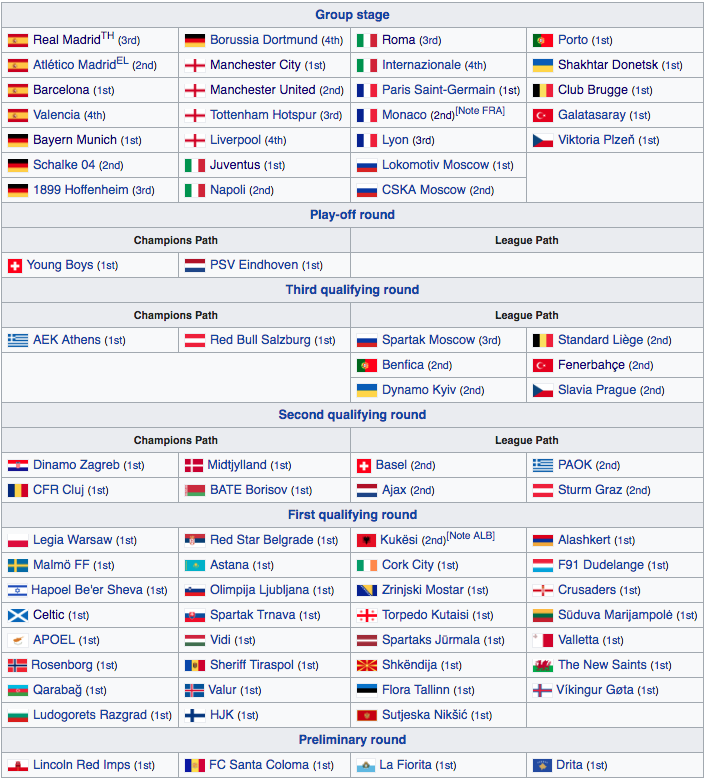The excitement of the 2018 World Cup is already starting to fade a bit and you can’t wait for more soccer of the highest quality. Fortunately, you won’t have to wait long. The 2018-19 UEFA Champions League season has actually already begun. You may have missed it, but fret not. This guide will tell you exactly how the Champions League works, focusing on the European Champions League.
Unlike most American sports, where teams play in a single competition for the regular season and then compete for the league championship in the playoffs, soccer clubs play in multiple competitions throughout the year. The best end up in the Champions League, which pools together the best clubs from around the world.
Now let’s get right to it.
How The Champions League Works
What Is The Champions League?
The UEFA Champions League is the premier continental club soccer competition in Europe. It began in 1955 (as the European Cup) and takes the top teams from all nations in UEFA.
The winner of the Champions League advances to the FIFA Club World Cup and plays in the UEFA Super Cup. The FIFA Club World Cup features winners of the Champions Leagues from around the world, including South America, North America, Asia, Africa and Oceania.
What Is The Europa League?
The Europa League is the secondary European club competition, which features clubs that couldn’t make the cut in the Champions League. Additionally, when the Europa League reaches the knockout stages, it adds the third-place finishers from the Champions League group stage.
The winner of the Europa League plays the winner of the Champions League in the UEFA Super Cup and earns a spot in the following season’s Champions League.
How Many Teams Are In The Champions League?
While 32 teams compete in the main group stage (eight groups of four teams), the tournament starts much earlier with 79 total clubs.
Who Is In The Champions League?
The Champions League allocates berths to each member nation based on the UEFA country coefficient. This takes into account the performance of each country’s teams in European competition from the last five years.
The 2018-19 Champions League gives four automatic berths to the top four countries: Spain, Germany, England and Italy. The allocations are as follows:
- 4: Spain, Germany, England, Italy
- 3: France, Russia
- 2: Portugal, Ukraine, Belgium, Turkey, Czech Republic, Switzerland, Netherlands, Greece, Austria
- 1: Everyone else (except Liechtenstein, which gets 0)
The following nations are qualified for the Champions League.

Screenshot via Wikipedia.
How Do You Qualify For The Champions League?
The aforementioned allocations mean the nations who finish in the given position for each of the UEFA member nations (ex: top 4 for England, top 2 for Belgium) enter the Champions League. However, most will not qualify for the group stage.
The top 11 nations in the UEFA country coefficient earn automatic berths into the group stage, as do the runners-up from the top six nations, third-place teams from the top five nations and fourth-place teams from the top four nations. These 26 teams are joined in the group stage by the remaining qualifiers who must go through up to five qualifying rounds.
The preliminary round includes the champions from the associations ranked 52-55. The champions from associations 20-51 (except Lichtenstein) join in at the first qualifying round.
The second qualifying round adds in four champions (16-19) and four runners-up (12-15), who take separate paths to give league champions a greater chance of qualifying. The third qualifying round adds two champions (14-15) to the Champions Path while the runners-up from 7-11 and third-place team from 6 join the League Path.
Finally, the playoff round adds two more champions (12-13). The playoff round whittles the Champions Path down to four teams and the League Path to two teams, who then enter the Champions League Group Stage.
All teams eliminated before the group stage have a chance to qualify for the Europa League.
When Are The Champions League Qualifying Rounds?
The preliminary round finished on June 29. The first qualifying round ends July 18. The second qualifying round concludes on August 1. The third qualifying round completes on August 14. The playoff round ends on August 29.
The group stage begins on September 18.
How Does The Champions League Group Stage Work?
The Champions League group stage is when the competition really starts for most fans. This is when the top teams from the top leagues enter the fray in eight groups of four.
The group stage draw on August 30 doles out each of the clubs into the various groups. The groups are seeded into pots and no club can play another club from its same league.
Pot 1 for the draw includes the Champions League and Europa League winners from the previous season and the champions from the top six leagues based on UEFA country coefficient. From there, the pots are seeded based on UEFA club coefficient, which is based on how each individual club has performed in Europe over the last five seasons.
The group stage is round robin with each team playing its three group opponents home and away. Three points are awarded for a win and one for a draw. The top two teams in each group (16 in total) advance to the knockout stages. The third-place team is parachuted into the Europa League.
For the first time, the Champions League group stage will include two matches per day (with the exception of the final match day) that kick off earlier than the rest for TV purposes.
How Do The Champions League Knockout Rounds Work?
After the group stage, a 16-team knockout tournament begins on February 12. The Round of 16, quarterfinals and semifinal are all two-legged affairs, with each team playing home and away. Away goals are in effect as a tie breaker, but if those are equal teams go into extra time during the second match.
For the first time, the Champions League will allow a fourth substitution to teams that go into extra time during the knockout rounds.
When Is The Champions League Final And How Does The Champions League Final Work?
The Champions League final in 2019 will be played at the Wanda Metropolitano in Madrid, Spain, on June 1.
The Champions League final will allow a fourth substitution in extra time if necessary. Additionally, for the first time, the 2019 final will allow teams to have a squad of 23 players instead of 18, meaning 12 substitutes instead of seven are available on the bench.
What Does The Champions League Winner Win?
The UEFA Champions League winner immediately earns the right to claim it is the best club in the world. While the winner of the Copa Libertadores might object, few others would argue this point.
In addition to bragging rights, the Champions League winner earns a berth to the next season’s tournament and a boatload of money, though the winner doesn’t always win the most money. In 2016-17 (the 2017-18 numbers aren’t in yet), Juventus took home the most money despite finishing second. Leicester City earned the second most despite only reaching the quarterfinals. Champion Real Madrid was only third on the earnings list.
The iconic European Champion Clubs’ Cup goes to the winner.
The UEFA Champions League winner also gets a spot in the UEFA Super Cup and the FIFA Club World Cup.
When Is The UEFA Super Cup?
The UEFA Super Cup in 2018 is August 15 between Real Madrid and city rival Atlético Madrid in Tallinn, Estonia. Real Madrid equals Barcelona with five Super Cup wins with a victory.
The 2019 UEFA Super Cup will be August 14 in Istanbul.
How Do You Watch The Champions League In The U.S.?
Fortunately for fans who had to put up with Fox at the World Cup, the broadcaster no longer has the rights to the Champions League. Unfortunately, the new rights holder has no soccer experience whatsoever.
Turner Sports now has the English-language rights to the Champions League in the U.S. The company has done alright since teaming up with CBS to broadcast the NCAA basketball tournament, allowing for every game to be shown on TV. However, Turner has decided to put just 47 of the more than 340 Champions League and Europa League matches on TV.
Select matches from the Champions League will be available on TNT, with the remainder on Bleacher Report Live, an untested streaming service. The costs are $2.99 per match, $9.99 per month or $79.99 per year.
In Spanish, people in the U.S. can watch on Univision and Univision Deportes Network.
Who Has Won The Most Champions League Titles?
Real Madrid has won 13 Champions League titles, including the last three and four of the last five, plus the first five. Following Real Madrid is AC Milan with seven. A three-way tie for third with five titles includes Bayern Munich, Liverpool and Barcelona.
Who Has Played The Most Champions League Games?
Goalkeeper Iker Casillas holds the record for most Champions League appearances with 167 with Real Madrid and Porto. Ronaldo is second 153 appearances and could catch him in a year or two.
Who Has Scored The Most Champions League Goals?
Cristiano Ronaldo’s 120 goals in 153 matches entering the 2018-19 season rank as the most all-time goals. Lionel Messi is second with 100 in 125 matches.





